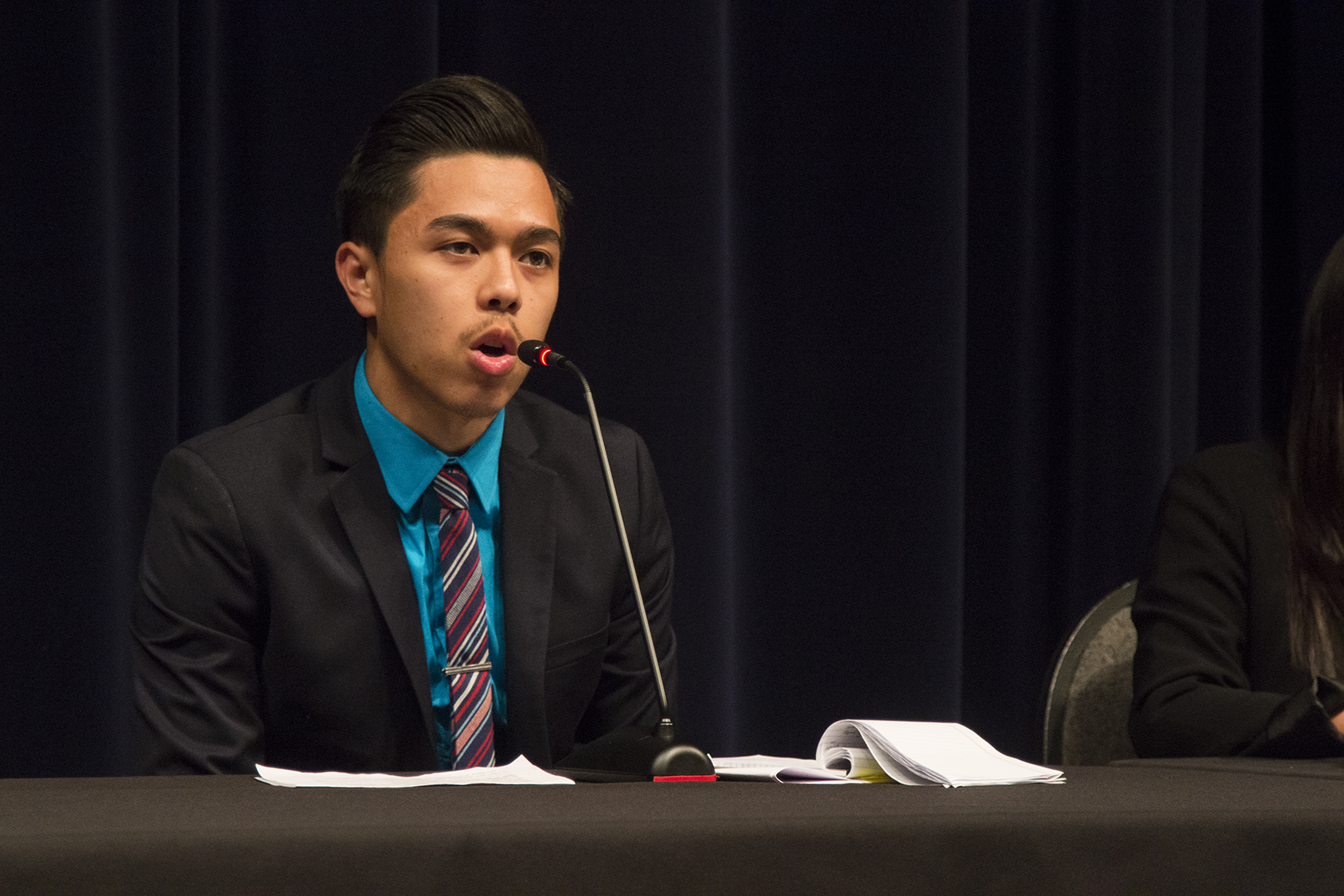Aram Ghoogasian: Vagueness, student fee hurt chances of passing referendum

Jazz Kiang, a third-year Asian American studies student and director of the Asian Pacific Coalition, who is one of the representatives for the Bruin Diversity Referendum, talked about its importance during last Friday’s Meet the Candidates event. (Chris Hoo/Daily Bruin senior staff)
By Aram Ghoogasian
Oct. 16, 2014 12:00 a.m.
Few things get students’ blood boiling like fee increases do.
That’s what makes asking students to voluntarily raise their own fees such a tricky endeavor.
The Bruin Diversity Referendum, a revamp of the referendum that failed to pass in 2013, is on the special election ballot. The referendum proposes a fee increase of $9.93 per quarter to fund various diversity-related programs. Referendums are placed on the ballot through a majority vote by student government, but are generally proposed by outside organizations.
The idea behind the referendum is not an unpopular one. Raising funds for various programs that will support diversity and diverse communities at UCLA is something people can get behind. But getting students to increase fees by $10 per student every quarter is a tougher sell, particularly when the organizations pushing for it aren’t giving students information they need.
Many of these organizations, like the Lesbian, Gay, Bisexual and Transgender Resource Center and the Community Programs Office, may need extra funding, but we can’t know for sure if budgets aren’t readily accessible to students. The authors of the referendum failed to provide a concise argument or the necessary budgetary information to convince students that these groups need the funding more than others.
At last week’s Undergraduate Students Association Council endorsement hearing, the students behind the referendum made their case, and what they said wasn’t very convincing.
Jazz Kiang, a third-year Asian American studies student and one of the students lobbying for the referendum, cited a potential loss of jobs and programming, and a decrease in printer paper in the Student Activities Center computer lab more specifically, as repercussions of not passing the referendum. Better talking points and more solid budgetary information could have and should have been presented to the student body. The appeal was lacking specificity to the say the least.
The process of getting the referendum on the ballot was just as poorly executed. The authors of the bill never provided USAC members with budget reports of the centers and groups that would be funded by the measure, which is why Campus Events Commissioner Greg Kalfayan dissented.
Additionally, the authors could not say how they came up with the amounts each group would receive if the referendum passes. If the people proposing the referendum themselves aren’t clear on specifically how much they need and why, the students likely won’t be either.
The authors’ failure to present a strong argument is tied to the referendum’s imprecise language as well as a lack of specific budgetary information; the referendum’s largest hurdles will likely be its price tag, the vagueness of the document itself and the process that led to it being placed on the ballot by USAC.
Many students think that the university as a whole would benefit from increased funding for places which provide programming for the student body, particularly for students of color and the LGBT community. But $30 per year is a substantial amount when it comes to voluntary fee increases, most of which are usually only a few dollars per year. If we’re going to invest that money, we have a right to know how it’s being spent.
Referendums with lower costs tend to pass more often than those that ask for large chunks of funding. The other referendum on the 2013 ballot was a typically low-cost one; the Bruin Bash Referendum was passed by a decent margin while the diversity referendum failed. Even though a concert seems trivial compared to the issue of diversity in general, the successful referendum had two things the previous diversity referendum didn’t have: a relatively low-cost and tangible results.
Just as many students support Bruin Bash, many students also support diversity efforts at UCLA. But if the referendum fails again, the consequences aren’t as clear-cut as losing funding for a major event like Bruin Bash.
The Arts Restoring Community Referendum was also relatively low-cost, a fact that likely helped it succeed at the polls last spring. We haven’t seen a referendum to rival the cost of the diversity referendum since the PLEDGE referendum, which funded the Daily Bruin, in 2009.
While the 13-page referendum lays out where the money will go, vague language like “programming” and “support for diversity” is used throughout the document, preventing students from understanding what specific effect their money is going to have. Students can’t make a a well-informed decision when they don’t know what effects their votes will have.
The authors and supporters of the referendum left a lot on the table as far as clarity and conciseness go, but the basic ideas are solid. A “yes” vote could probably do the campus and its students some good, but doing a messy job of promoting the referendum only hurts its chances of passing.
These shortcomings could be its undoing, allowing us to see just how severe the consequences of a “no” vote could be.


